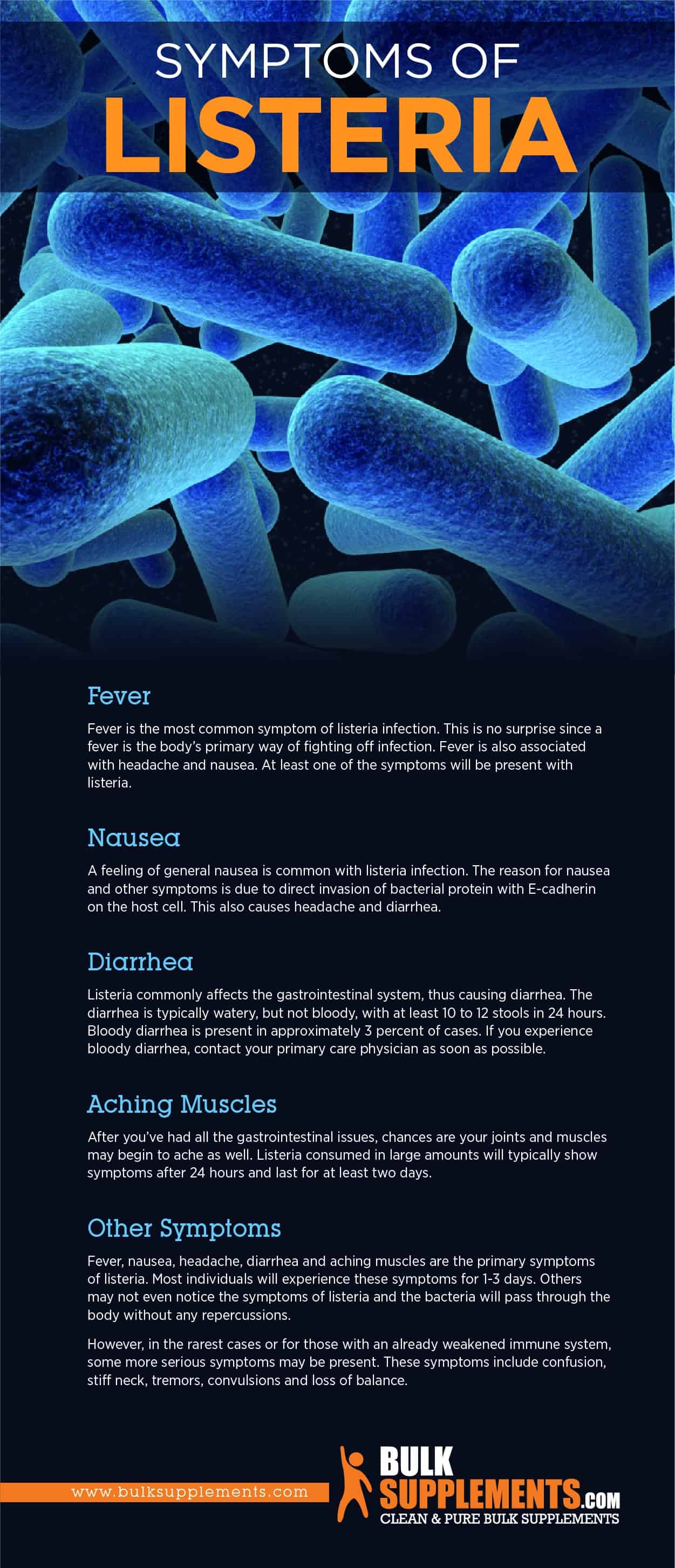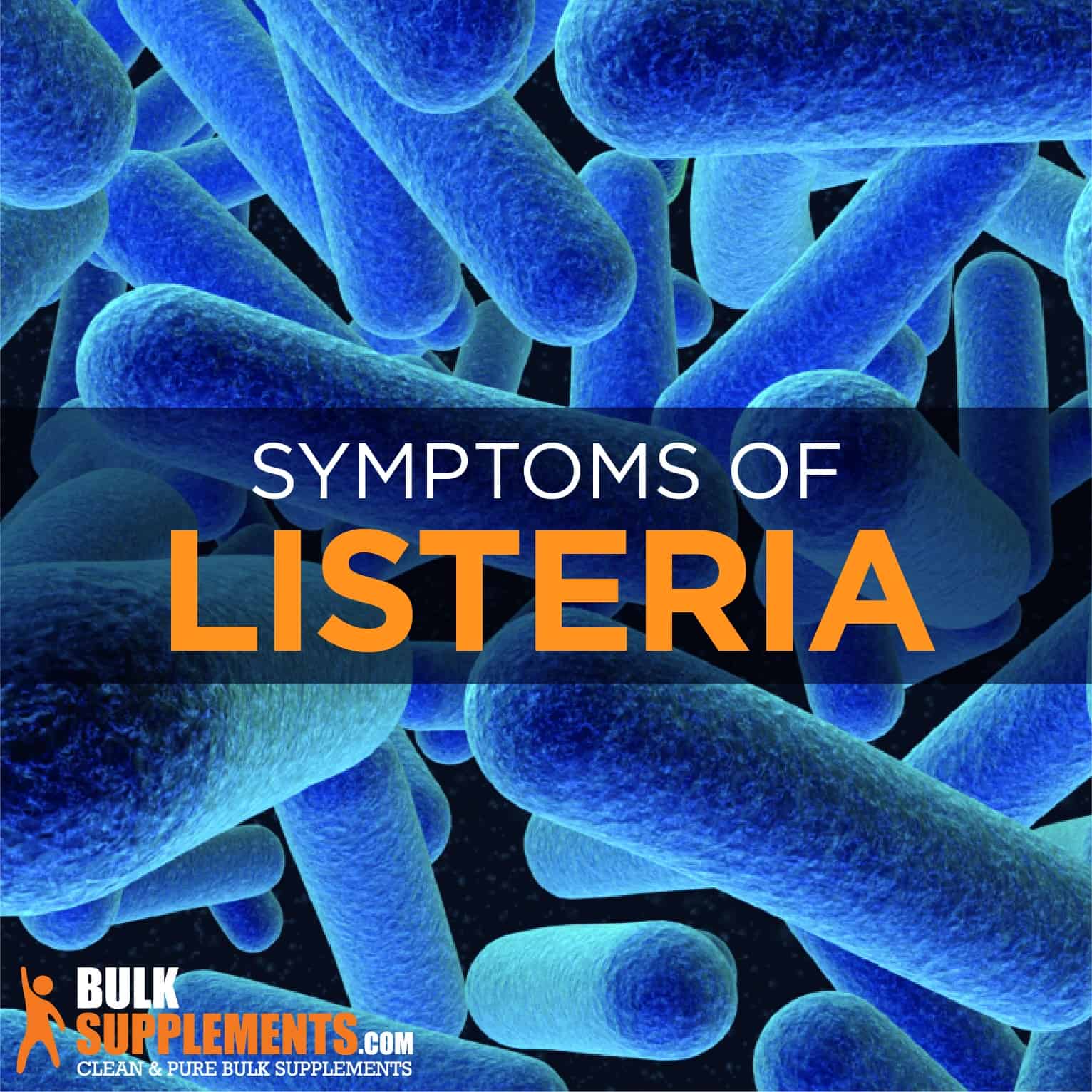What is Listeria?
Sometimes, you can contract the listeria infection and never notice it. However, high-risk infected individuals may suffer from severe consequences, and mortality rates are exceptionally high. Listeria is a food-borne infection caused by the Listeria monocytogenes bacteria, responsible for approximately 1,600 illnesses per year — 20 to 30 percent of which are fatal. Unfortunately, it is nothing to take lightly. (x)
In 1919, presumably, G. Hulpher isolated the bacteria from a rabbit’s liver. In 1926, two colleagues described the same bacteria as Hulpher by producing it in rabbits and guinea pigs. The bacteria surfaced in South Africa as a cause of an epidemic among rodents near the Tiger River region. A couple of human cases popped up in 1929, and by 1940 the organism had its name. (x)
Since the isolation of listeria in 1919, the microorganism in humans is rare. However, the bacteria primarily affect elderly, immunocompromised persons — suppressed immune systems, pregnant women and newborns. (x)
Listeria and Pregnancy
Listeria infection is most common in pregnant women, newborns, the elderly and anyone with a weakened immune system. Not only are pregnant women far more likely to contract listeria, but they are also the only ones most likely to have severe cases.
Pregnant women with a listeria infection can pass it to the unborn child in the womb and cause miscarriages, stillbirth and preterm labor. You can avoid listeria if you are pregnant, and pregnant women must be mindful of the foods to avoid during pregnancy.
Listeria leads to listeriosis, septicemia and meningitis. In the brain, it can also cause paralysis and tremors, encephalitis and meningoencephalitis. Although some cases of listeria can go unnoticed, it is crucial to seek medical attention if you experience muscle pain, flu-like symptoms, nausea, diarrhea or stiff neck.
Medical doctors often recommend that pregnant women avoid preserved meat, deli meat, sushi, smoked salmon and some cheeses.
Listeria Symptoms
It’s important to know the signs of having listeria. Especially if you fall in one of the four susceptible categories. Symptoms include:
- Fever
Fever is the most common symptom of listeria infection. It’s no surprise since a fever is the body’s primary way of fighting off infection. Also associated with headaches and nausea is fever. At least one symptom will be present if you have listeria. (x)
- Nausea
A feeling of general nausea is common with listeria infection. The reason for nausea and other symptoms is the direct invasion of bacterial protein with E-cadherin on the host cell. It also causes headaches and diarrhea. (x)
- Diarrhea
Listeria commonly affects the gastrointestinal system, thus causing diarrhea. The diarrhea is typically watery but not bloody, with at least 10 to 12 stools in 24 hours. Bloody diarrhea is present in approximately 3 percent of cases. If you experience bloody diarrhea, contact your primary care physician as soon as possible. (x)
- Aching Muscles
After you’ve had all the gastrointestinal issues, chances are your joints and muscles may begin to ache as well. Listeria consumed in large amounts will typically show symptoms after 24 hours and last for at least two days.
Other Symptoms of Listeria
Fever, nausea, headache, diarrhea and aching muscles are the primary symptoms of listeria. Most individuals will experience these symptoms for 1 to 3 days. Others may not even notice the signs of listeria, and the bacteria will pass through the body with no repercussions.
However, some more severe symptoms may be present in the rarest cases or those with an already weakened immune system. These symptoms include confusion, stiff neck, tremors, convulsions and loss of balance.
Causes of Listeria
Knowing the causes of listeria can help you avoid contracting the bacteria. Some causes include:
- Listeria Bacteria
The most common cause of listeria infection is the consumption of the Listeria monocytogenes bacteria. It is an intracellular pathogen, the most common causative organism in several outbreaks of food-borne disease. The listeria bacteria can multiply within host phagocytic cells — immune system — and spread quickly from cell to cell, hence its short incubation period. You can find listeria bacteria in meat, poultry and seafood products. (x) Phagocytes are cells that ingest or digest foreign particles to protect the body. (x)
- Unpasteurized Milk
Although listeria stems from meat products, you can find it in raw unpasteurized milk. Listeria monocytogenes can survive in a range of temperatures and pH levels in milk, which makes it highly common. It includes all types of raw milk such as cow, sheep and goat’s milk. (x)
- Contaminated Vegetables
Contaminated vegetables are becoming an increasingly common cause of listeria. Most importantly, it is especially true of vegetables without thermal processing. Vegetables typically become contaminated when they come into contact with contaminated soil, manure or irrigation water. The recent rise in listeria outbreaks has led to further improvements in the cleaning and decontamination of vegetables. (x)
- Contaminated Meat
Contaminated meat, especially deli meat, is a common cause of listeria. In 2015, there were 270 deaths related to listeria-contaminated meat. The bacteria are in slaughterhouses, deli meat factories and other meat retail locations, so cross-contamination is common. In order to prevent contamination, food handlers should improve their hygiene routines by being more aware of possible contamination. (x)
- Processed Foods
Processed foods like processed deli meats are yet another cause of it. Individuals who work with processed foods should be vigilant against the bacteria by ensuring that workstations are thoroughly clean. (x)

Listeria Risk Factors
The causes above are the most common producers of listeria. However, there are others associated with low immune systems and old age.
- Being over 65 years old
- AIDS
- Kidney disease
- Undergoing chemotherapy
- Cirrhosis
- Diabetes
- Surgical removal of the spleen
- Anti-rheumatoid arthritis medication
Supplements for Listeria
The following supplements may help you prevent or overcome food poisoning effectively quickly. Consult with your caregiver before taking any new supplements. Some to consider for the infections include:
- Coconut Water
Coconut water is a highly effective natural remedy for listeria because it is high in electrolytes. When the body is losing electrolytes because of diarrhea, it is easy to become dehydrated. Drinking coconut water can restore electrolytes and keep the body hydrated. There is no recommended dosage for coconut water, but you should always consult your doctor before taking even natural supplements. (x)
You can add one tablespoon of coconut powder or, as desired to water, or smoothies to help stay hydrated. (x)
- Garlic
Garlic’s antimicrobial effects are beneficial when the body is fighting infection. When it comes to food-borne pathogens such as listeria, garlic can decrease inhibition by 80 percent. Garlic can also preserve processed food and stop the spread of contamination in the first place.
The recommended dosage of garlic is 170 mg to 1 g three to four times daily. (x)
- Ginger
Ginger helps soothe the stomach. Use caution when self-treating and talk to your doctor before adding anything to your diet while ill. You can take up to 1,000 mg of ginger root extract once a day and take it with a large glass of water to avoid heartburn. (x)
- Apple Cider Vinegar
Apple cider vinegar is well-known for its internal benefits within the body. In the case of listeria, however, apple cider vinegar powder works externally to wash contaminated vegetables. This method is highly effective for washing food-borne pathogens down the drain, including listeria and E. Coli. (x)
Where to Buy Supplements for Listeria or Food Poisoning?
You can purchase these supplements for listeria infection at BulkSupplements.com. The company is an industry-leading manufacturer and distributor of pure dietary supplements.
BulkSupplements.com is not just a consumer brand. It also supplies pure ingredients to other food and supplement brands to make their products. All products at BulkSupplements.com are manufactured and tested according to current and proper manufacturing practices.
Are you interested in trying any of these powders or supplements mentioned in this article as a possible solution to helping you with the infection or food poisoning? Contact BulkSupplements.com to place an order today.
Remedies for Listeria
Most doctors can share ways to help you feel better when you have an illness like listeria infection or food poisoning. Here are some solutions that have proven results:
- BRAT Diet (Bland Diet)
For a typical person, not a pregnant woman, listeria is essentially a nasty case of food poisoning with a scientific name. The traditional recommended diet for those with severe stomach upset is the BRAT diet which stands for:
- B-bananas
- R-rice
- A-applesauce
- T-toast
These bland foods are ideal anytime you experience vomiting, nausea or diarrhea because they pass quickly through the system. Additionally, several of these foods have a high-water content which can help keep a person hydrated. (x)
However, doctors recommend returning to a regular diet as soon as possible.
- Stay Hydrated
An individual with listeriosis will become dehydrated through diarrhea and vomiting. Drinking as much water as possible can ease these symptoms.
It is imperative to stay hydrated when suffering an infection like food poisoning or listeria. Dehydration itself can have highly damaging effects in itself.
- Food Hygiene
As the old saying goes, “prevention is better than the cure.” It is better to keep something from happening instead of dealing with it after it’s happened. A few tips for cleaning and handling your food include:
- Always clean kitchen surfaces with hot soapy water, especially during and after handling meat
- Scrub raw vegetables with a brush under running water
- Use a meat thermometer when cooking meat to ensure you have thoroughly cooked it
- Use deli meat including hot dogs within a week of opening
- Wash hands thoroughly. Clean whole melons under hot, soapy water as well
Avoid High-Risk Foods to Prevent Listeria Infection
For pregnant women, prevention is even more critical. During pregnancy, you should avoid deli meats and unpasteurized milk entirely. If you have a weakened immune system or you are elderly, this is also a good recommendation.
The Bottom Line
While listeria can pass unnoticed, it can also cause a severe infection which can even be fatal. It is widespread in pregnant women who may have the most severe consequences as a consequence of contracting the bacteria, such as miscarriage, stillbirth and preterm labor.
Listeria is commonly present in contaminated meat, vegetables, processed foods and unpasteurized milk.
In general, take caution when consuming certain foods and wash raw produce thoroughly. In doing so, you might just successfully prevent a terrible case of food poisoning. If you experience food poisoning, contact your healthcare provider and consider adding supplements to your diet. Garlic, coconut powder and ginger may have positive results in your recovery.
These statements have not been evaluated by the Food and Drug Administration. These products are not intended to diagnose, treat, cure or prevent any disease.


